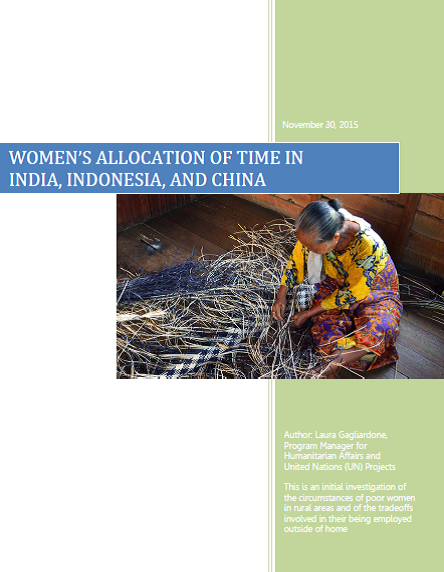Hello, I am Laura Gagliardone. For about twelve years, I have worked for the UN System and NGOs as Program Development and Evaluation, and Communications Specialist; and galvanized the international community on the 17 Sustainable Development Goals (SDGs).
Relevance: Among all Global Goals, there is one – Goal 5: Gender Equality and Women’s Empowerment – which we all are called to prioritize as we need women’s support to implement the SDGs by 2030.
Hot Tip: Gender equality is not only a fundamental human right, but a necessary foundation for a peaceful, prosperous, and sustainable world. When women and girls are provided with equal access to education, health care, decent work, and representation in political and economic decision-making processes, they become empowered and happier colleagues, partners, mothers, sisters, and daughters.
Hot Tip: Question yourself on how women live their life and spend their time daily. Conduct research and analyze Time Use Surveys (TUSs): irregular national surveys conducted to collect information about how people use their time. Find out the areas of women’s employment and evidence on how including them in the labor market would benefit the economy. Prepare recommendations focusing on: paid and unpaid work, program design, policy development, and psychological factors for mentality and behavior changes.
Lessons Learned: In 2015, I have conducted a research and prepared a study on the ‘Women’s Allocation of Time in India, Indonesia, and China’ since time is a direct source of utility, and how people spend it impacts economic growth, gender equality, and sustainable development. Through TUSs, the report presents data which can be utilized as basis for understanding, measuring and monitoring the society over which policies can be formulated, assessed, and modified. In India, the findings show that women’s work is often scattered, sporadic, and poorly diversified, and they spend long hours on unpaid work. Therefore it is recommendable to (1) reduce and redistribute unpaid work by providing infrastructures and services; (2) design programs to improve women’s skills and enable them to access better jobs and enter new sectors as wage earners and entrepreneurs; and (3) design policies to improve the management of natural resources. In Indonesia, the lessons learned suggest that (4) mentality and behavior changes are to be encouraged and promoted. Women are meaningfully engaged in all three areas of work (productive, reproductive and community) and the opportunity for additional economic interventions targeted to them has great economic and social transformative potential. In China, there has been a reduction of poverty incidence and the private sector, through job creation and income generation, has assisted this process, while support within families and strong work ethics have made further invaluable contributions. Yet, women’s poverty still exists and is chronic in some rural areas.
Report available through EmpowerWomen.org (funded by the Government of Canada and facilitated by UN Women): Women’s Allocation of Time in India, Indonesia, and China.
The American Evaluation Association is celebrating International and Cross-Cultural (ICCE) TIG Week with our colleagues in the International and Cross-Cultural Topical Interest Group. The contributions all this week to aea365 come from our ICCE TIG members. Do you have questions, concerns, kudos, or content to extend this aea365 contribution? Please add them in the comments section for this post on the aea365 webpage so that we may enrich our community of practice. Would you like to submit an aea365 Tip? Please send a note of interest to aea365@eval.org. aea365 is sponsored by the American Evaluation Association and provides a Tip-a-Day by and for evaluators.


This is a great post! I learned a lot from this.
This is a critically important issue and perspective. Thanks for sharing your insights Laura. MQP
Dear Dr. Patton, it is a privilege to receive a comment from you. Thanks for having taken the time to read my blog. You are the one who has taught me, years ago in Washington, DC, ‘if you see me, I do exist’. Women’s work needs to be seen and valued to accelerate the implementation of the 2030 Agenda. With high esteem, Laura
Much appreciated, deserves widespread attention MQP
This is a useful and thoughtful piece. While much work is being done in different countries on this topic there is still a long way to go, no matter what the size or stage of development of each country. Laura shows her commitment and dedication. She will see results. Laura needs further opportunities to increase her contribution and impact!
Thanks Mr. Ehlers for your comment and support, as always. My blog aims to provide evidence on gender equality and SDGs related issues to hopefully inspire some reflections. These days, from April 23rd to 26th, 2018, countries are meeting in New York to harness potentials towards mobilizing greater financing for sustainable development. And I suggest reviewing where we are at as far as gender equality, women’s empowerment, and sustainable economic growth are concerned to orchestrate a more and more inclusive, coordinated, and effective plan of action. Laura Gagliardone
I think this posting is right on target and much needed to raise awareness, consciousness, and action. I would only add that the benefit of adopting a feminist theoretical lens is that it helps to surface issues and circumstances that might otherwise be taken for granted. Keep up the good work Laura.
Thanks Dr. Fetterman for adding your insights to my blog and for being there, as a mentor and a friend, since 2010. You have taught me about Empowerment Evaluation and I think that empowering women and girls is more and more needed these days to make sure that all sustainable development programs are inclusive. At the same time, I think that empowering men and boys is fundamental so that we all learn how to live and work together. Laura